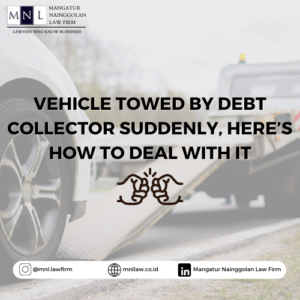
Basically, the vehicle retrieval is a consequence of the Debtor’s failure to fulfill obligations in the Fiduciary Guarantee Agreement. Pursuant to Law Number 42 of 1999 concerning Fiduciary Guarantee (“UU 42/1999”), the imposition of a Fiduciary Guarantee on an Asset is made through a notarial deed in the Indonesian language, which will subsequently become the Fiduciary Guarantee Deed. Furthermore, in Article 11 paragraph (1) jo. Article 12 paragraph (1) of UU 42/1999, the asset burdened with a Fiduciary Guarantee must be registered with the Fiduciary Registration Office. This is to obtain a Fiduciary Guarantee Certificate which holds the same executory power as a final and binding court decision as described in Article 15 paragraph (2) of UU 42/1999. The mandatory registration requirement is also stipulated in Article 23 of Financial Services Authority Regulation Number 29 of 2014 concerning the Conduct of Financing Companies (“POJK 29/2014”):
“Financing Companies are prohibited from repossessing motor vehicles as fiduciary collateral if the Fiduciary Registration Office has not issued a fiduciary certificate and surrendered it to the Financing Company.”
The executorial power under UU 42/1999 grants authority to the Creditor to unilaterally execute or arbitrarily withdraw the Fiduciary Guarantee object. Therefore, Constitutional Court Decision Number 18/PUU-XVII/2019 and Constitutional Court Decision Number 2/PUU-XIX/2021 serve as legal foundations regarding the execution of Fiduciary Guarantee objects where Creditors cannot forcibly execute themselves if the Debtor does not acknowledge any breach of contract (default) and the Debtor refuses to voluntarily surrender the object of the Fiduciary Guarantee. Thus, to execute the Fiduciary Guarantee object, the Creditor must submit an execution request to the District Court.
Concerning Fiduciary Guarantee objects retrieved through Debt Collectors, Financing Companies or lessors must have a cooperation agreement with Debt Collectors, therefore, Debt Collectors here are required to be under one legal entity that has obtained permission from the relevant authorities as stipulated in Article 49 of Financial Services Authority Regulation Number 30/POJK.05/2014 concerning Good Corporate Governance for Financing Companies. Additionally, Debt Collectors must also have a professional certification in debt collection from PT Indonesian Financing Company Certification.
If a Debt Collector forcibly retrieves a vehicle that is the object of a Fiduciary Guarantee without a power of attorney delegating the authority to retrieve the Fiduciary Guarantee object from the Financing Company/Creditor to the Debt Collector, plus the absence of a professional certification card, they may be charged under Article 365 of the Indonesian Criminal Code (“KUHP”) regarding Theft, Article 368 KUHP regarding Robbery. Furthermore, if the Debt Collector does not carry/possess a Fiduciary Guarantee Certificate for the Fiduciary Guarantee object to be retrieved, they may be charged under Article 378 KUHP regarding Fraud:
“Article 365 KUHP:
- A person who commits theft preceded, accompanied, or followed by violence or threats of violence against a person with the intent to prepare or facilitate the theft, or in the event of being caught in the act, to enable self-escape or that of other participants, or to maintain control over the stolen property, shall be punished with imprisonment for a maximum of nine years.
2. A person shall be punished with imprisonment for a maximum of twelve years if:
-
- The act is committed at night in a house or enclosed yard containing a house, in a public place, or on a moving train or tram;
- The act is committed by two or more persons acting in collusion;
- Entry into the place of committing the crime is gained by breaking in, climbing, or using false keys, false orders, or false official attire;
- The act results in serious injury.
3. If the act results in death, the person shall be punished with imprisonment for a maximum of fifteen years.
4. A person shall be punished with death penalty or life imprisonment or imprisonment for a maximum period of twenty years if the act results in serious injury or death and is committed by two or more persons acting in collusion, accompanied by one of the circumstances described in No. 1 and 3.”
“Article 368 KUHP:
- Anyone who, with the intention of benefiting themselves or others unlawfully, coerces someone by violence or threats of violence to give a thing, wholly or partially belonging to that person or another, or to make an account or cancel a debt, shall be punished for extortion with imprisonment for a maximum of 9 years.
- The provisions of Article 365 paragraphs two, three, and four apply to this offense.”
“Article 378 KUHP:
Anyone who, with the intention of benefiting themselves or others unlawfully, by using a false name or false status, through deception, or a series of lies, induces another person to surrender a thing to them, or to give a loan or cancel a debt, shall be punished for fraud with imprisonment for a maximum of 4 years.”
Therefore, if the vehicle that is the object of the Fiduciary Guarantee is forcibly retrieved by a Debt Collector while the Debtor does not voluntarily surrender the vehicle, the Debtor can take the following steps in dealing with the Debt Collector:
Ask for the identity of the Debt Collector, especially their Professional Certification Card;
- Asking for the identity of the Debt Collector, especially their Professional Certification Card;
- Ask for the Power of Attorney held by the Debt Collector;
- Ask for the Fiduciary Guarantee Certificate;
- Inquire whether there is a Court Order from the District Court regarding the execution of the Fiduciary Guarantee object.
If the Debt Collector persists and disregards the above requests, you can directly seek assistance from the nearest Police Authorities or request legal assistance from a Lawyer or Legal Consultant.
If you require Legal Consultation, you can contact us through:
Email: Secretary@mnllaw.co.id
Phone: 0812 9539 7825 / 0813 98941976
